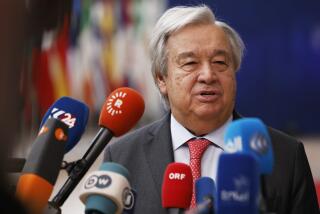EC Refuses to Ease S. African Sanctions : Trade Bloc Renounces Violence in a Rebuke Aimed at A.N.C.
- Share via
DUBLIN, Ireland — The 12-nation European Community today called on all South Africans to renounce violence in a declaration that Britain said was directed squarely at Nelson Mandela’s African National Congress.
But the leaders of the trade bloc, at the end of a two-day summit, refused to ease sanctions against South Africa’s white-led government, saying they need “further clear evidence” that changes to end apartheid will continue.
The statement came as Mandela was being lionized on a visit to the United States, where he called for sanctions to be maintained. But Mandela also caused unease in Washington by his continued refusal to renounce violence.
British Prime Minister Margaret Thatcher said it was a “great pity” that the EC nations were “unable to agree publicly to make a start now on easing sanctions.”
“What they have done is something I am very pleased about,” she added. “They have condemned pretty clearly anyone who advocates violence . . . and that goes straight to the armed struggle in no uncertain terms, and that ought to be abandoned.”
Despite the refusal to lift sanctions, South Africa’s government welcomed the EC statement.
“What the declaration says, albeit not is so many words, is that South Africa has regained international respectability,” Foreign Minister Roelof F. (Pik) Botha said in Pretoria. “The use of violence is rejected,” he added. “By implication, this means that the ANC’s adherence to the armed struggle is unacceptable.”
On the issue of South African sanctions, the community said it “affirms its willingness to consider a gradual relaxation of this pressure when there is further clear evidence that the process of change already initiated continues.”
“The European Council calls on all parties . . . to refrain from violence or advocacy of violence,” the communique said.
The leaders described South African President Frederik W. de Klerk as a man of “foresight and courage” and said Mandela has “inspired millions of South Africans opposed to apartheid.”
But in effect, the community stuck to a position adopted at a summit in Strasbourg, France, six months ago. Since then, De Klerk has begun a reform program, including releasing Mandela after 27 years in jail, legalizing the ANC and scrapping some apartheid laws.
More to Read
Sign up for Essential California
The most important California stories and recommendations in your inbox every morning.
You may occasionally receive promotional content from the Los Angeles Times.













